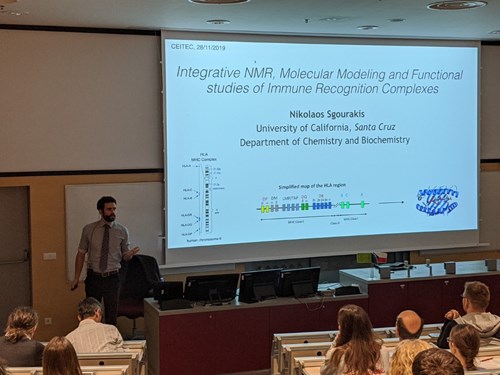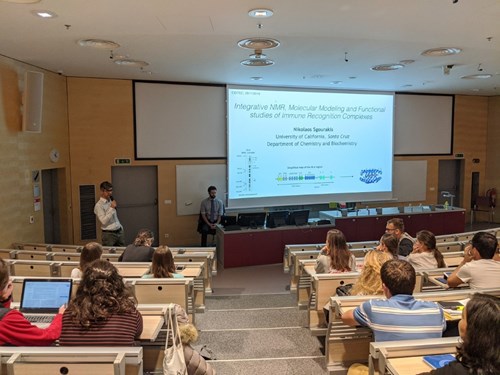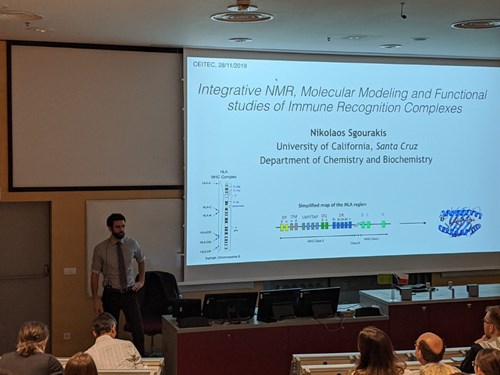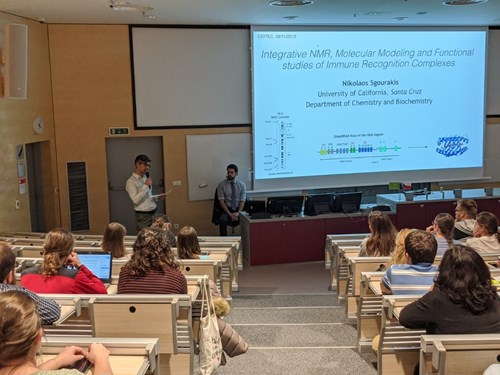Integrative Studies of Immune Recognition Complexes
-
28 November 2019
4:00 PM - University Campus Bohunice (pavilion B11/ seminar room 132)
Speaker
Assoc. Prof. Nikolaos G. Sgourakis
Department of Chemistry and Biochemistry, University of California, Santa Cruz, USA
"We study proteins of the immune system that play important roles in human health. To perform their role, these proteins must interact with other biomolecules, such as other protein receptors and smaller peptides. Elucidating these molecular interactions at high resolution will help establish the biochemical basis of immune recognition. Besides obtaining an unprecedented basic science understanding of fundamental biological processes, the knowledge gained from our detailed molecular description will enable us to develop new therapeutic molecules for emerging immunotherapy applications to combat viral infections, autoimmune diseases and cancer.
To achieve these goals, we employ a variety of biophysical techniques, including X-ray crystallography, fluorescence spectroscopy, solution NMR, and computational modeling, followed upon by functional experiments using cell lines."
See more information at Sgourakis Research group website.
Hosted by
About the lecture
Protein dynamics have been implicated in regulating key aspects of class I major histocompatibility complex (MHC-I) function, including the selection and loading of peptide antigens. In recent work, we have characterized the peptide loading cycle of the molecular chaperone TAPBPR, a structural homolog of Tapasin that serves as the main catalytic enhancer of antigen loading in cells. The human population contains thousands of allelic variants of MHC-I, with a range of dependencies on chaperones for peptide editing and no obvious rationale emerging from the recent crystal structures of TAPBPR/MHC-I complexes. Using TAPBPR as a model, we combine deep mutagenesis with functional and biophysical data, especially solution NMR to define sites of conformational dynamics, to provide a complete view of the molecular determinants of chaperone recognition. We find that: 1) inside the cell, TAPBPR interacts broadly with nascent or misfolded MHC-I molecules functioning as a molecular holdase, while 2) interactions with peptide-loaded molecules exhibit a strong MHC-I allelic dependence, dictated by dynamics at the interacting protein domains. Our data provide significant evidence that localized protein motions underpin the allele-dependent differences in their intrinsic ability to interact with chaperones. The importance of MHC-I dynamics unifies all our findings, with broad recognition of conformationally unstable, nascent MHC-I becoming restricted to a smaller set of MHC-I alleles that retain relevant dynamic motions in the folded state. Building up in complexity and scale, our findings can be leveraged to design barcoded antigen libraries encompassing 100s of neoepitope specificities towards probing polyclonal T cell repertoires.
Journal References:
Peptide exchange on MHC-I by TAPBPR is driven by a negative allostery release cycle, McShan A.C., Natarajan K., Kumirov V.K., Flores-Solis G., Jiang J., Badstubner, Toor J.S., Bagshaw K., Kovrigin E.L., M., Margulies D.H., and Sgourakis N.G., Nature Chemical Biology, 14(8):811-820 (2018)
High Throughput pMHC-I Tetramer Library Production Using Chaperone Mediated Peptide Exchange, Overall S.A., Toor J.S., Hao S., Yarmarkovich M., Nguyen S., Japp A.S., Moschidi D., Betts M.R., Maris J.M., Smibert P., and Sgourakis N.G., bioRxiv, 30 May 2019, https://doi.org/10.1101/653477
A Recurrent mutation in anaplastic lymphoma kinase with distinct neoepitope conformations, Toor J.S., Rao A.A., McShan A.C., Yarmarkovich M., Nerli S., Yamaguchi K., Madejska A.A., Nguyen S., Tripathi S., Maris J.M., Salama S.R., Haussler D., and Sgourakis N.G., Frontiers in Immunology, 9:99 (2018)
Share event



